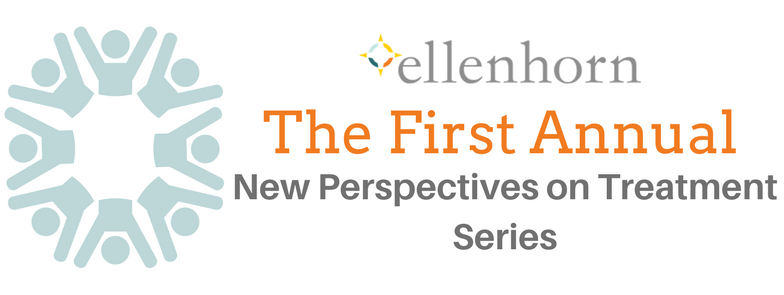
Ellenhorn is pleased to announce a year-long series of talks investigating collaborative approaches to treatment, the science behind collaboration, the research on its effectiveness in therapy, and different means for building collaborative relationships with clients.
Decades of research on the common therapeutic factors leading to change repeatedly show that the most effective therapeutic relationships are collaborative ones. Too often, however, the notion of collaboration is approached by treaters as a starting point rather than as a destination. Many individuals who enter treatment, and especially those with complex issues, do so either because they suffer from a basic distrust of the world or out of compliance with the demands of others–scenarios that are poison to collaborative relationships. For these clients, the very idea that we start treatment with a partnership seems suspect, dangerous and bound to fail them. Try as we might to offer them the nutrients of a therapeutic alliance, they likely won’t metabolize what we offer.
Starting with the goal of a strong treatment alliance with our clients is easy; co-creating one with people who don’t trust us is hard work. When we call such individuals “treatment non-compliant,” “difficult to engage,” or “resistant,” we miss the point, seeing their reluctance to engage with us as purely a matter of their own flaws or issues, and not reflecting on our own misguided belief that our trustworthiness is a given.
Our series offers various breakfast and lunch-time presentations over the course of a year. From a discussion of the science and research on collaborative relationships in therapy, to talks about Mentalization-Based Treatment, the Finnish model of Open Dialogue, expressive arts techniques and psychosocial approaches and therapies for substance misuse, we addresses the process of fostering therapeutic partnerships with individuals who are reluctant to enter into them.
Series Schedule
02/27: The Only Truth that Sticks: Distrust and the Complicated Path to Therapeutic Collaboration
Ross Ellenhorn, PHD
8:00 AM – 10:00 AM
Click here to register!
04/12: Recovery from Addictive Processes and Psychosocial Injuries through Therapeutic Collaboration
Zoi Andalcio, LMHC, CPT
12:00 PM – 2:00 PM
Click here to register!
06/12: Integrating Open Dialogue in PACT and Other Systems
Ross Ellenhorn, PhD
8:00 AM – 10:00 AM
Click here to register!
08/14: Mentalization for Teams: The Collaborative Nature of Curiosity
Carlene MacMillan, MD
12:00 PM – 2:00 PM
Click here to register!
10/16: Screen Signals: Healing through Social Media Influenced Projectives and Imagery
Anna Boyd, LCAT
8:00 AM – 10:00 AM
Click here to register!
12/12: The Social Psychological Ingredients for Collaboration: Self-Determination, Self Esteem, and Social Support
Ross Ellenhorn, PhD and Kent Harber, PhD
12:00 PM – 2:00 PM
Click here to register!
Can’t make it? Watch it online!
We will be broadcasting each talk online for those to watch who aren’t able to physically make it. However, please note that unfortunately we cannot offer CE credits for those who watch online.
Continuing Education
This event is co-sponsored by Ellenhorn, LLC and The Institute for Continuing Education. The program offers 2.00 contact hours with full attendance required. There is no additional charge to receive CE credit. Application forms and other required CE materials will be available on site. If you have questions regarding continuing education, the program, faculty, grievance issues, or for a listing of learning objectives, please contact The Institute at: 800-557-1950; e-mail: instconted@aol.com.
To receive continuing education credit, participants must complete all CE forms, sign in/out at designated locations, and submit an evaluation of the sessions attended.
CE Credit: It is the responsibility of attendees to check with their state licensing/certification board to determine if CE credit offered by The Institute for Continuing Education will meet the regulations of their board.
Psychology: The Institute for Continuing Education is approved by the American Psychological Association (APA) to sponsor continuing education for psychologists. The Institute for Continuing Education maintains responsibility for this program and its content.
Counseling: The Institute for Continuing Education is recognized by the New York State Education Department’s State Board for Mental Health Practitioners as an approved provider of continuing education for licensed mental health counselors. Provider MHC-0016.
NOTE: NBCC credit is not offered.
Social Work: The Institute for Continuing Education, Provider 1007, is approved as a provider for social work continuing education by the Association of Social Work Boards ( ASWB ), www.aswb.org, through the Approved Continuing Education ( ACE ) program. The Institute for Continuing Education maintains responsibility for the program. ASWB Approval Period: 04-13-2015 – 04-13-2018. Social workers should contact their regulatory board to determine course approval for continuing education credits.
New York: The Institute for Continuing Education is recognized by the New York State Education Department’s State Board for Social Work as an approved provider of continuing education for licensed social workers. Provider No. 0025.
New Jersey: This program has NOT been submitted to the NJ Board of Social Work for pre-approval.
Marriage-Family Therapy: The Institute for Continuing Education is recognized by the New York State Education Department’s State Board for Mental Health Practitioners as an approved provider of continuing education for Licensed Marriage and Family Therapists. Provider MFT-0012.
Skill Level: This program is appropriate for mental health professionals of all skill levels.
Instructional Methodology: May include didactic, lecture, audio visuals, demonstrations.

